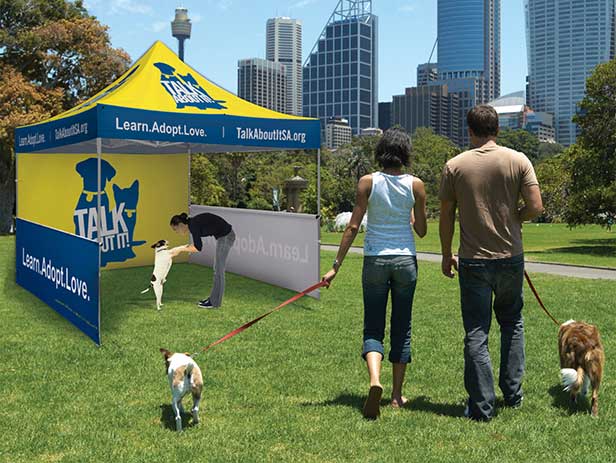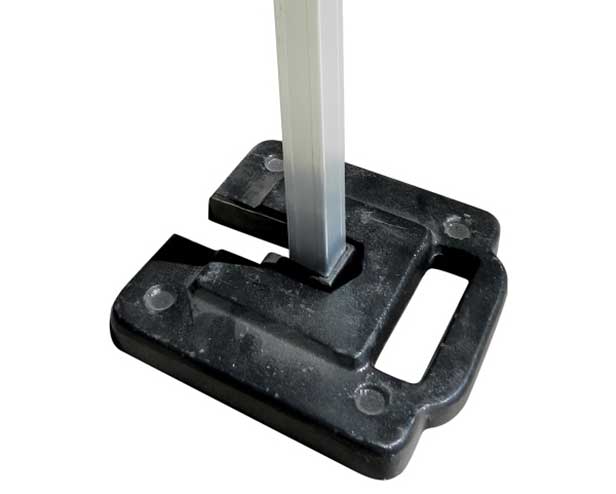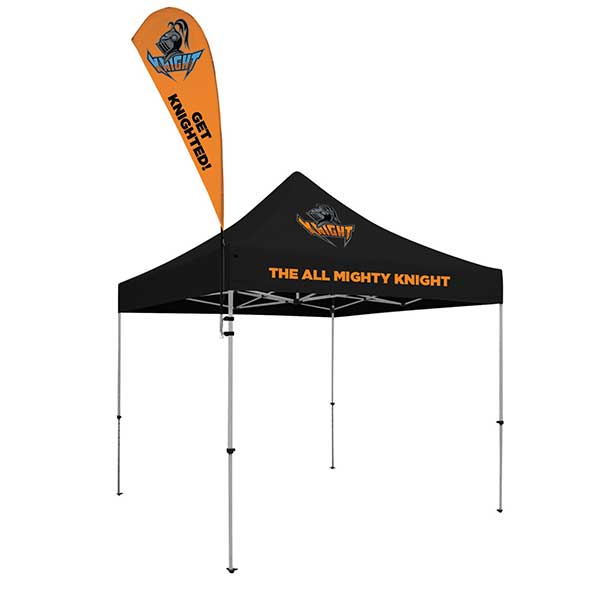News June 12, 2020
Tent Sales Shift Gears With Summer Event Cancellations
Restaurants, retailers and COVID-testing sites are purchasing tents and accessories as they move services outdoors.
In a typical summer, fairs, festivals, company picnics and other events all would require branded tents. A rash of cancellations due to the coronavirus pandemic has pretty much erased that need. However, tents sales remain robust, thanks to the rise of curbside pickup and outdoor eating.
In fact, customers at a slew of retailers spent 47% more on party tents and event canopies in April than they did a year earlier, research firm Edison Trends shared with the Wall Street Journal recently.

This standard 10-foot tent kit (240619), available from Showdown Displays, can be purchased with full- or half-wall siding.
In the promotional products industry, the overall demand for tents and related items isn’t greater than it otherwise would be this time of year, but the uses for the products have shifted gears to accommodate curbside pickup and mobile COVID-testing sites, according to Bruce Kolbrener, executive vice president of sales at Quinn (asi/80228) in Hanover, PA.
In late April, Quinn manufactured a large amount of white tents to have on hand for immediate shipment. Many of these were sold to supply the increasing demand for outdoor COVID-testing facilities.
Showdown Displays (asi/87188) of Brooklyn Center, MN, has noticed a similar change in the use of its tents and accessories.
Kevin Walsh, president, says watching Showdown Display’s tent sales is like watching a duck on a lake.
“You don’t really see all the action that’s taking place underneath,” Walsh says.
Statistically, he says, tent sales aren’t much different than they were a year ago. However, the use-cases or “underwater action” for those tents have changed dramatically.
Tent suppliers are also seeing a change in requests for tent décor. While a company would normally order tents featuring its logo or name multiple sides of the canopy, many tents are now being purchased with only one or two graphics on them.
Kolbrener speculates that this is due to companies trying to be more frugal. He also thinks businesses are purchasing tents as a short-term investment, anticipating that business will soon return to normal.
Showdown Displays has seen an increase in event tents purchased with accessories, including flags, weights and even hand-sanitizing dispensers attached to a tent’s leg, Walsh notes.

A tent leg weight (CPT-5001T2), available from Quinn, is a must-buy for those working in windy conditions.
Weighted anchors ensure the tents can withstand harsher weather conditions, protecting workers and customers in states that experience wind or rain in the summer months. Sanitizing dispensers and optional vinyl or plexiglass siding provide an extra measure of safety for guests approaching the tents for food, drinks or other services.
Restaurants, breweries, retailers and testing servicers also are purchasing siding to their tent canopies. Both full- and half-wall coverage can be decorated with text or a logo.
“There are a lot of accoutrements … associated with tents that allow the distributor to really tailor that canopy directly to what the end-user needs,” said Walsh.
“By the time an educated distributor speaks to [the end-users] and … talks through their use-case, they could end up with a much larger sale,” he said. “And certainly, a much more functional product.”
As national and local businesses slowly reopen, suppliers and distributors are working to make their lives easier and businesses more functional.
An essential complement to a tent is signage. Whether a tent is decorated or not, “sale signs” can help create additional awareness that businesses are functioning outdoors.

Showdown Display’s sail sign mount (240521) is perfect for grabbing the attention of those walking nearby.
For businesses that are investing in a tent but want to avoid purchasing a new canopy as things change, Quinn has begun sewing hook-and-loop fasteners into their tents and signs, allowing for users to attach new banners later on.
While tent sales still have a place in the market, event cancellations have nonetheless caused a big change in the promotional products industry. So, Quinn has responded creatively, offering wall barriers to restaurants to be purchased with tents and accessories as they begin to seat people inside.
“We’re just trying to think of things that would help them get through this situation and continue to do business safely,” said Kolbrener. “I think everybody’s in the same situation.” Including suppliers, he added.
Kolbrener expects the demand to last through the summer, as some farmers markets and festivals come back and retailers continue to function via curbside pickup.
Walsh expects this “new norm” of curbside and mobile testing sites to be implemented at least through next year.
Like everyone else, lots of businesses in the promotional products industry are doing things they wouldn’t normally do, including selling personal protective equipment (PPE).
“But there’s a need out there and that’s good,” Kolbrener said. “People need to get these products, and it’s important.”
